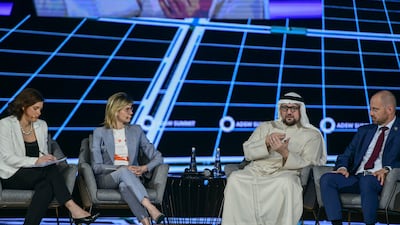Abu Dhabi’s clean energy company Masdar has the 'right capital and fuel' to accelerate the development of renewable projects, according to its chief executive.
"We are sponsored by three very important [and] strong shareholders, [it] started with Mubadala 16 years ago, and recently, we welcomed Adnoc and Taqa to our company," Mohamed Al Ramahi told Abu Dhabi Sustainability Week on Monday.
"It means that we have also the right capital and fuel, to be clear, green fuel, to accelerate the deployment of renewable energy.”
Last month, the Abu Dhabi National Energy Company, better known as Taqa, Mubadala Investment Company and Adnoc completed a deal to become shareholders in Masdar. The move is expected to help Masdar grow rapidly on a global scale under an expanded mandate that covers renewable power, green hydrogen and other clean energy technology.
Established by Mubadala in 2006, Masdar took a leadership role in the global clean energy sector and also helped to drive the nation’s economic diversification and climate action agenda.
Masdar is currently active in more than 40 countries and has invested or committed to invest in projects worth more than $30 billion.
The company is targeting a renewable energy portfolio capacity of at least 100 gigawatts by 2030, with the majority share of it coming from wind and solar technology.
“We were the first to commit to renewable energy. When the leadership set up Masdar 16 years ago, the region had zero renewable energy in its energy mix. All of our region was dependent on fossil fuels, but today, we went from zero to almost 13 per cent of our energy coming from clean renewable energy sources,” Mr Al Ramahi said.
The UAE is also committed to achieving "net zero by 2050, and we will continue our journey and implement and deploy clean energy solutions”, he said.
The Emirates is investing Dh600 billion ($163.3 billion) in clean and renewable energy projects over the next three decades as it aims to achieve net zero emissions by 2050. It is building the Mohammed bin Rashid Solar Park in Dubai with a five-gigawatt capacity. Abu Dhabi, which is developing a two-gigawatt solar plant in its Al Dhafra region, has set a target of 5.6 gigawatts of solar photovoltaic (PV) capacity by 2026.
“In Africa, we are the largest renewable energy company… deploying and accelerating renewable energy projects across sub-Sahara, North Africa,” Mr Al Ramahi said.
In November last year, a Masdar-led consortium announced a 10-gigawatt wind project in Egypt. One of the largest wind farms in the world, it will reduce carbon dioxide emissions by 23.8 million tonnes per year, equivalent to 9 per cent of Egypt’s current output, Masdar said.
It also signed an agreement with Tanzania Electric Supply Company (Tanesco) to develop renewable energy projects with a combined total capacity of up to two gigawatts.
Masdar and Tanesco are establishing a joint venture entity that will initially focus on the development of solar PV and onshore wind clean energy projects with a capacity of about 600 megawatts.
Madar also pledged $200 million to finance projects as part of the Energy Transition Accelerator Financing platform launched by the International Renewable Energy Agency, according to Mr Al Ramahi.
In 2021, the UAE launched the Energy Transition Accelerator Financing platform to accelerate the transition to renewable energy in developing countries. Abu Dhabi Fund for Development is also supporting the platform.
Investment in renewable energy needs to double to more than $4 trillion by the end of the decade to meet the net-zero emissions target by 2050, the International Energy Agency said in its World Energy Outlook last year.


















































